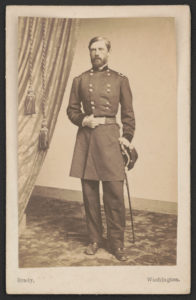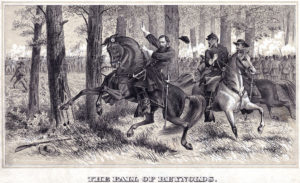Accountability – personal and organizational – is one of the most critical and oft-discussed leadership and performance topics. But can leaders take the concept of accountability too far?
The story of Major-General John Reynolds and his untimely death at the Battle of Gettysburg offers a real-world example that allows us to think more deeply about properly scoping accountability.

A 42-year-old West Point graduate, John Reynolds was one of the most highly-respected corps commanders in the Army of the Potomac and had been offered command of that 90,00-man organization just a month before the battle. Reynolds had declined, fearing the army’s proximity to Washington, D.C., would subject him to constant micromanaging from both military and civilian superiors. As the Union Army moved north pursuing Robert E. Lee’s Confederates, Reynolds oversaw the “Left Wing” of the Army of the Potomac – roughly 30,000 men in the I, III, and XI Corps.
On the night of June 30, 1863, Reynolds received a report from cavalryman John Buford that his division had encountered Confederates about ten miles north on the roads just west of Gettysburg. Reynolds – a Pennsylvania native – determined to advance to defend his native state.
The Battle of Gettysburg began the following morning when Confederates encountered Buford’s cavalrymen outside Gettysburg. The cavalrymen delayed the advancing Confederates for several hours. Finally, just as the Confederates had pushed the Union cavalry back to the outskirts of the town, Reynolds led onto the field the Iron Brigade – about 1,800 men belonging to the 1st Division of his I Corps. As these veteran infantrymen arrived, Reynolds could see that the Union situation was at a critical point: Confederates advancing through Herbst’s Woods were about to flank the cavalrymen.
Military science taught that the position of a corps commander in battle was several hundred yards behind the front lines where they could coordinate all of their various units. But at this moment, John Reynolds determined to leave nothing to chance and personally moved forward with the Iron Brigade to ensure they went into action in the way he desired. In Civil War folklore, such leadership is often heralded as leading from the front or inspiring his men. In this case, it was a fatal decision. Less than ten minutes after arriving on the field, John Reynolds was struck by a bullet and killed, the only corps commander on either side to lose his life during the Battle of Gettysburg.
With Reynolds dead, his “deputy” stepped up to command. That man was Abner Doubleday, the legendary inventor of baseball. Without Reynolds, Union efforts west of Gettysburg were poorly coordinated, and nearly 10,000 of the 20,000 defenders would become casualties before nightfall.

What do we make of Reynolds’ actions, then?
First, what about Abner Doubleday and the impact of Reynolds’ actions on his development? When, in a moment of crisis, senior leaders move back down the ladder and take tactical control of a situation they have deprived their subordinates of the chance to learn and develop. As we consider the organization’s long-term health and its ability to grow the leaders of tomorrow, this becomes problematic. Thus, it is perhaps not surprising that after Gettysburg, the Union high command decided Abner Doubleday was not ready to command the I Corps and instead went outside the unit to the VI Corps to find a man to take over for Reynolds.
Some may argue that long-term development is well and good but that in the short term, sometimes firefighting is necessary. Reynolds’ fate suggests the potential downsides to this solution. By over-involving himself with tactical actions, Reynolds needlessly put himself in danger. Modern leaders who routinely involve themselves in the detailed technical work similarly put so much on their plate that they risk various health problems leading to burnout.
Lastly, a leader who gets overly involved in the day-to-day or technical parts of the job often loses sight of the broader, more strategic functions. As Reynolds focused on the 1,800 men of the Iron Brigade, what was happening with the other 28,000 men over whom he was supposed to be exercising command?
In a moment of crisis, it feels great to do something – it feels like assuming accountability – but before jumping into action, there are three questions we should ask:
- Am I encroaching on an area of responsibility better delegated to someone else?
- Am I becoming overly involved in technical work that is eventually going to lead to burnout?
- Is focusing on this problem distracting me from broader strategic issues for which I am responsible?
There is no doubt that John Reynolds was a fantastic commander, but in this case, organizational accountability would have meant not leading the Iron Brigade into action.




Recent Comments